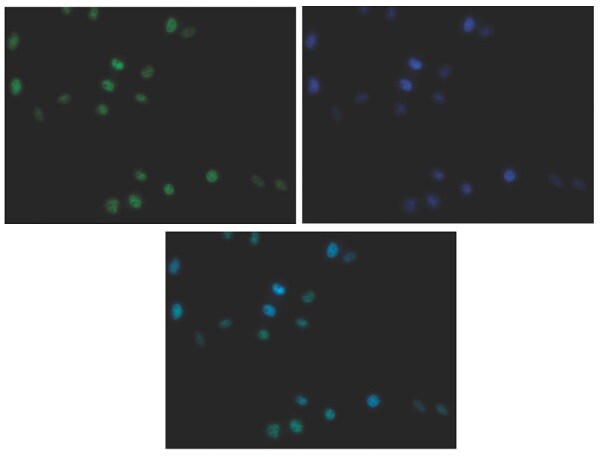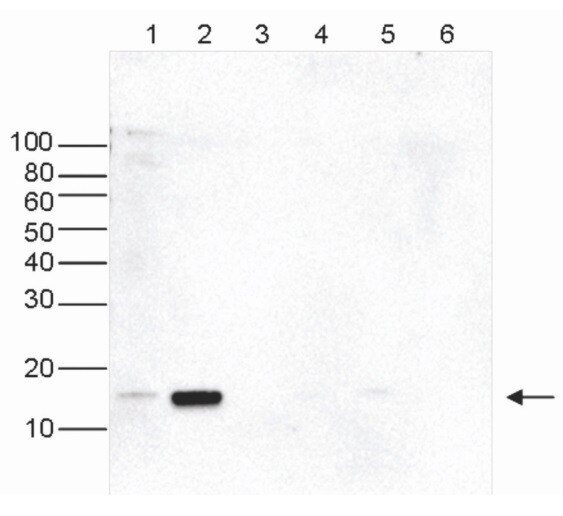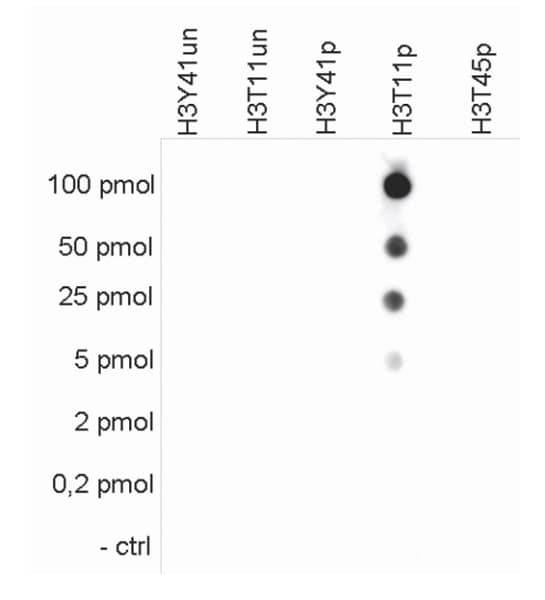Anti-Histone H3 (phospho T11) antibody (ab233199)
Key features and details
- Rabbit polyclonal to Histone H3 (phospho T11)
- Suitable for: ICC/IF, Dot blot, ChIP, WB
- Reacts with: Human, Recombinant fragment
- Isotype: IgG
Overview
-
Product name
Anti-Histone H3 (phospho T11) antibody
See all Histone H3 primary antibodies -
Description
Rabbit polyclonal to Histone H3 (phospho T11) -
Host species
Rabbit -
Tested applications
Suitable for: ICC/IF, Dot blot, ChIP, WBmore details -
Species reactivity
Reacts with: Human, Recombinant fragment -
Immunogen
Synthetic peptide corresponding to Human Histone H3 (phospho T11) conjugated to keyhole limpet haemocyanin.
-
Positive control
- ChIP: Chromatin from HeLa cells treated with colcemid. WB: HeLa treated with colcemid whole cell and histone extracts. ICC/IF: Colcemid treated HeLa cells.
Properties
-
Form
Liquid -
Storage instructions
Shipped at 4°C. Store at +4°C short term (1-2 weeks). Upon delivery aliquot. Store at -20°C long term. Avoid freeze / thaw cycle. -
Storage buffer
Preservatives: 0.05% Sodium azide, 0.05% Proclin 300
Constituent: PBS -
 Concentration information loading...
Concentration information loading... -
Purity
Affinity purified -
Clonality
Polyclonal -
Isotype
IgG -
Research areas
Images
-
ChIP assays were performed using HeLa (Human epithelial cell line from cervix adenocarcinoma) cells, treated with colcemid, ab233199 and optimized PCR primer sets for qPCR. ChIP was performed using sheared chromatin from 1.5 million cells. A titration of the antibody consisting of 0.5, 1, 2 and 5 µg per ChIP experiment was analysed. IgG (2 µg/IP) was used as negative IP control. QPCR was performed with primers for the EIF4A2 and GAPDH promoters, used as positive controls, and for the coding region of the inactive MYT1 gene and the Sat2 satellite repeat, used as negative controls. Image shows the recovery, expressed as a % of input (the relative amount of immunoprecipitated DNA compared to input DNA after qPCR analysis).
-
HeLa (Human epithelial cell line from cervix adenocarcinoma) cells were treated with colcemid and stained with ab233199 and with DAPI.
Cells were fxed with 4% formaldehyde for 10 minutes and blocked with PBS/TX-100 containing 5% normal goat serum and 1% BSA. The cells were immunofluorescently labeled with ab233199 (left) diluted 1/200 in blocking solution followed by an anti-rabbit antibody conjugated to Alexa®488. The right panel shows staining of the nuclei with DAPI. A merge of the two stainings is shown on the bottom.
-
All lanes :
Lane 1 : HeLa (Human epithelial cell line from cervix adenocarcinoma) whole cell extract at 25 µg
Lane 2 : HeLa (Human epithelial cell line from cervix adenocarcinoma) cells treated with colcemid, histone extract at 15 µg
Lane 3 : Recombinant histone H2A at 1 µg
Lane 4 : Recombinant histone H2B at 1 µg
Lane 5 : Recombinant histone H3 at 1 µg
Lane 6 : Recombinant histone H4 at 1 µg
Predicted band size: 15 kDaDilution buffer: TBS-Tween containing 5% skimmed milk.
-
To test the cross reactivity of ab233199 a Dot Blot analysis was performed with peptides containing other histone phosphorylations and the unmodifed H3T11. One hundred to 0.2 pmol of the respective peptides were spotted on a membrane. ab233199 was used at a dilution of 1/20,000.
ab233199 shows a high specificity for the modification of interest.

















